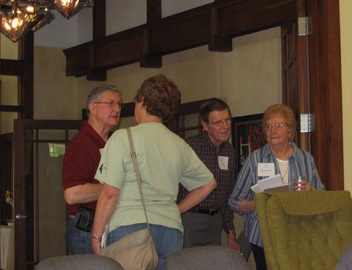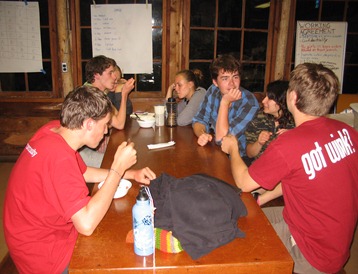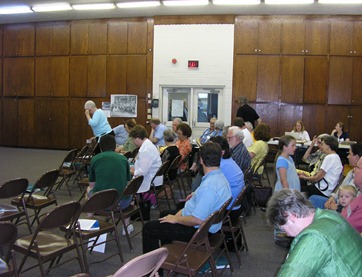I was speaking with a friend recently about the spiritual state of his Meeting. The Meeting in question probably has an average attendance of seventy five, and benefits from an excellent meetinghouse, moderately populated children’s program, and a fairly solid level of engagement – both practical and financial – from the congregation. As a community, the Meeting is doing pretty well. Yet, my friend was concerned: Community is good and worth developing, but how do we move beyond mere human community and into a shared relationship with God?
In many congregations, human community often becomes the focus rather than shared commitment to discipleship and mission. Rather than challenging one another, we often focus primarily on giving one another warm fuzzies and a place to fit in. Rather than reaching out to the world, it is tempting to place our emphasis on fulfilling the desires of the already-established community. If we succumb to this temptation, the Meeting can become primarily a place of refuge from the world, and even from the challenging face of God.
than challenging one another, we often focus primarily on giving one another warm fuzzies and a place to fit in. Rather than reaching out to the world, it is tempting to place our emphasis on fulfilling the desires of the already-established community. If we succumb to this temptation, the Meeting can become primarily a place of refuge from the world, and even from the challenging face of God.
In examining the spiritual state of his Meeting, my friend observed interesting parallels between the youth programs in his Yearly Meeting and the state of the adult community. He remembered the way in which his children began to distance themselves from their Quaker youth group – and from Quakerism – as they grew more secure and comfortable in their schools and social lives. The kids who remained part of the Meeting’s youth group tended to be ones who struggled to find their place in other areas of their lives. They felt like outsiders at school, and the Quaker youth programs and camps were the place where they felt most accepted and cared for. As the children of the Meeting grew older, the youth group became increasingly a collection of young people who did not fit in anywhere else.
What this meant was that the youth group became the primary community and social bond for these young people. They might not fit in at school or at home, but they could feel sure that at least their fellow Quaker youth would be on their side. This environment of affirmation and nurture is clearly very important, and those who participate in it surely benefit in a variety of ways. However, there may be unintended consequences that arise from youth programs that focus primarily on social circles and belonging. Through a set of shared rituals – jazz hands, cuddle puddles, and wink – and shared cultural assumptions and behaviors, the primary purpose of the Quaker youth community becomes about supporting “people like us.” In the extreme, Quakerism boils down to being “a place for good people like us.”
fit in at school or at home, but they could feel sure that at least their fellow Quaker youth would be on their side. This environment of affirmation and nurture is clearly very important, and those who participate in it surely benefit in a variety of ways. However, there may be unintended consequences that arise from youth programs that focus primarily on social circles and belonging. Through a set of shared rituals – jazz hands, cuddle puddles, and wink – and shared cultural assumptions and behaviors, the primary purpose of the Quaker youth community becomes about supporting “people like us.” In the extreme, Quakerism boils down to being “a place for good people like us.”
In my friend’s experience, this in-group dynamic is not limited to the youth. On the contrary, he saw the way that adult religious communities can be formed primarily around human needs for social and emotional security, rather than out of a corporate commitment to discipleship and mission in the world. My friend saw that there could be a pervasive “tribal” ethos in the adult Meeting. Just like the youth group, the adult Meeting saw itself as being made up of “good people” who provide a refuge for others who do not fit into the surrounding culture. Politically liberal folks with a transcendentalist spiritual bent; folks with a focus on eco-justice; pacifists; and individuals that, for whatever reason, do not fit in anywhere else. They can find a place in the Meeting Tribe.
None of this is bad, per se. People need a community where they feel accepted and loved for who they are, and the Church has always been such a place for those who are the most marginalized in the cultures where we have found ourselves. And yet, having a community that is primarily predicated on acceptance of others based on tribal values – shared rituals, assumptions and life experience – can pose a great spiritual danger: The community can become more about providing comfort and security than about growing in holiness and service to Christ; it can become more focused on nurturing our peculiar habits and assumptions than it is on risking the safety of the status quo in order to lead lives of service to our neighbors who do not share our tribal affinities.
always been such a place for those who are the most marginalized in the cultures where we have found ourselves. And yet, having a community that is primarily predicated on acceptance of others based on tribal values – shared rituals, assumptions and life experience – can pose a great spiritual danger: The community can become more about providing comfort and security than about growing in holiness and service to Christ; it can become more focused on nurturing our peculiar habits and assumptions than it is on risking the safety of the status quo in order to lead lives of service to our neighbors who do not share our tribal affinities.
How can we strike an appropriate balance between our comforting affinity groups and the challenging fellowship that God calls us into with our dissimilar neighbors? How can we tell the difference between the universally relevant Tradition, which we have received from God, and those habits and customs that are based more in the peculiarity of our tribe than in Christ’s continuing revelation? What would it take for us to become a people who, rather than treating our communities as retreats from the world, instead treated them as centers for mutual support and renewal, training and equipping us to do the work of God together in our broken world? What would it be like if we threw wide the doors of our Meetings to anyone, regardless of their ideological and political views, socio-economic status, reading ability, fashion habits and food preferences?
treated them as centers for mutual support and renewal, training and equipping us to do the work of God together in our broken world? What would it be like if we threw wide the doors of our Meetings to anyone, regardless of their ideological and political views, socio-economic status, reading ability, fashion habits and food preferences?
What would it take for us to live our lives in the vibrant fellowship that God offers, rather than being content with our broken cisterns? Come, taste and see that the Lord is good! We are blessed when we take refuge in the shadow of God’s wings.(1)
–
1. see Psalm 34:8